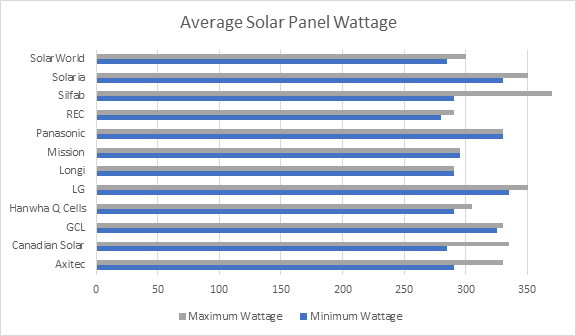The solar panel with the highest watt is the sunpower e series a commercial solar panel line.
Solar panel wattage explained.
If the installer or salesperson talks aout a 190w or 250w panel they are talking about the max power rating of the panels.
Solar panel ratings explained.
Most solar panel brands on the market claim a positive power tolerance of between 3 5 meaning their panels may be over their pmax at stc.
The first 400 watt residential solar panel was released by sunpower in march 2019 but you can now find several panels from different manufacturers that are around this wattage.
As explained above the number of panels needed to reach 1 000 kwh per month changes depending on local sunshine and panel wattage.
Grid tie solar panels with 60 cells are often referred to as 20v nominal panels like the solarworld sunmodule 290w solar panel.
For example if the solar panel is rated at 175 watts and the maximum power voltage vmp is given as 23 6 volts then calculate the current as 175 watts divided by 23 6 volts which is equal to 7.
A solar panel s nameplate wattage might be 265 watts but in standard test conditions the actual wattage produced can vary slightly.
Pmax is the rated power output of a solar panel at standard test conditions with a cell temperature of 25.
That panel is rated at 100 watts at peak efficiency meaning on a 78 degree cloudless day at solar noon on the equator during the equinox.
The top panel in the e series comes out at a whopping 435 watts.
The max power rating in watts that your solar panels are rated at is the figure that everyone quotes when talking about panel size.
It s typically not enough to really affect energy production but the smaller the variation the better.
As recently as 2016 17 solar panels with output ratings of 250 watts were common.
This rating is based on the power output measured from that panel under.
Posted by brandi casey on 22nd jun 2018 when comparing solar panels it is important to consider output wattages total capacity and power output.
It starts to get tricky when you move away from battery based solar systems and the 12v increments are no longer necessary.
The production output of solar panels varies depending on a number of factors such as where you live number of sun hours ambient temperature and efficiency ratings.
They have too high of a voltage to charge a 12v battery bank with a traditional charge controller but too low of a voltage to charge a 24v.
Here are the power tolerances of our 3 panels.
To simplify calculations solar radiation is specified in peak sun hours per day.

